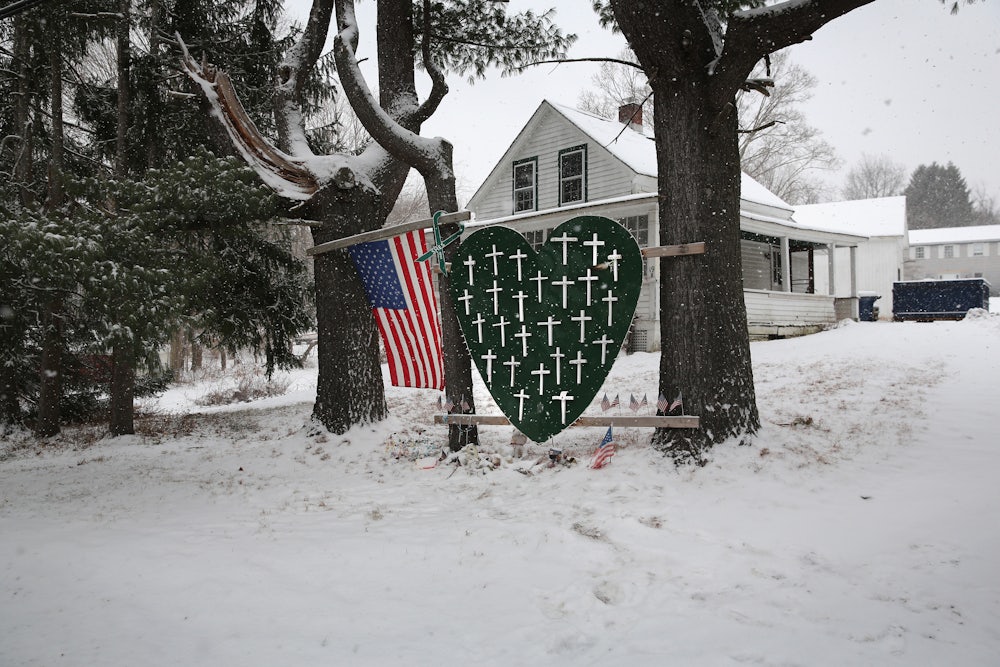Newtown is the sort of tragedy that remains too painful to talk about: Even thinking about it can be overwhelming. Less than a minute into Newtown, the new documentary about the 2012 shooting at Sandy Hook Elementary School, a neighbor who lived just down the street from the school recalls seeing a teacher and some students in front of his house in the aftermath of the shooting. “They…” he says, pausing so as not to break down. “They were so upset.” But the recollection itself is too much, and he begins to cry. Twenty-six people killed, 20 of them first graders, in a matter of seconds. Even typing out the facts of it feels unfathomable. You don’t have to have a five-year-old like I do to have the horrors rattle you to your core. It is one of those tragedies that makes you wonder whether anything means any damn thing at all.
The problem for a documentary like Kim Snyder’s Newtown, which follows family members of the victims as they try to make some sense of their lives, is that it is almost impossible for us to understand what these people have gone through. They can tell us, we can see it on their faces, but we can’t truly know. And what makes a good, decent person—never pushing, never digging in too deeply—isn’t necessarily what makes an effective documentarian. Newtown keeps its audience at a respectful distance. This kind and compassionate stance towards the families is vital for their trusted relationship with the filmmakers, but it also makes the film feel less like a feature documentary and more like something that would play on a loop in the gift shop of a memorial. It is compelling and devastating, but it does all this from the other side of the room. Newtown never attempts to ask the unaskable.
About a decade ago, I visited the Oklahoma City National Memorial & Museum and noticed that Timothy McVeigh’s name is not only nowhere to be found on site, it is considered unspeakable. McVeigh and his accomplices are called “the assailants” and nothing more. I’m deeply grateful that’s the case there, but once I step outside the complex, it’s important to see the context of what led to the bombing and what happened afterward. Nothing happens in a vacuum, and you need that distance to process the event in total. Newtown has the advantage of having access to the particulars, but it doesn’t— and can’t, really—put the events in a proper place for the audience. The parents’ grief overwhelms everything: The film focuses on Mark Barden, David Wheeler and Nicole Hockley, all of whom lost their children in the shooting, and their sorrow hangs on them like a jacket. They have come together to try to keep, in whatever way they can, their children’s memories alive: Some take up the cause of gun violence, some preserve their child’s room, some struggle with siblings’ survivor’s guilt. It is awful and incredibly tough to watch.
To what end is all this grief? The film follows the parents, particularly Barden and Hockley, and their attempts to pass some sort of gun control legislation through Congress. These attempts, of course, fail—as they would in the aftermath of mass shootings yet to come. But the film is not a polemic about gun control. The notion of gun violence looms over every second of the film but the movie is so wary of politicizing grief that it ends up feeling like weak soup. There are tons of stories here that are fascinating and worth telling, from the differing opinions of some of the parents on gun violence—does tragedy bring out new parts of you, or just double down on who you already are?—to the monstrosities of the Sandy Hook Hoax wingnuts who terrorize many parents to this day. The movie touches on all of these things but delicately, so not to knock over any of the furniture. But Sandy Hook made me, and millions of others, want to go knock over some furniture.
I don’t mean to be so hard on Newtown; this is a powerful film that brings the viewer to the people most devastated by this tragedy. It is well-intentioned and respectful and shows honor in its resistance to push any harder than it has to on a community that has been through the worst humanity has to offer. But that respect has its limits. The movie is so understated that it’s almost barely there. Perhaps a theoretical Newtown documentary isn’t so close to the families at all, but digs into scary places that are both mournful and unsettling. This might not be the best movie for the families, but it would be able to take that step back, to take that grief and use it rather than be swallowed by it. Newtown is a portrait of tragedy and loss, and a deeply moving one. But this story is about more than just that.
Grade: B
Grierson & Leitch write about the movies regularly for the New Republic and host a podcast on film. Follow them on Twitter @griersonleitch or visit their site griersonleitch.com.
